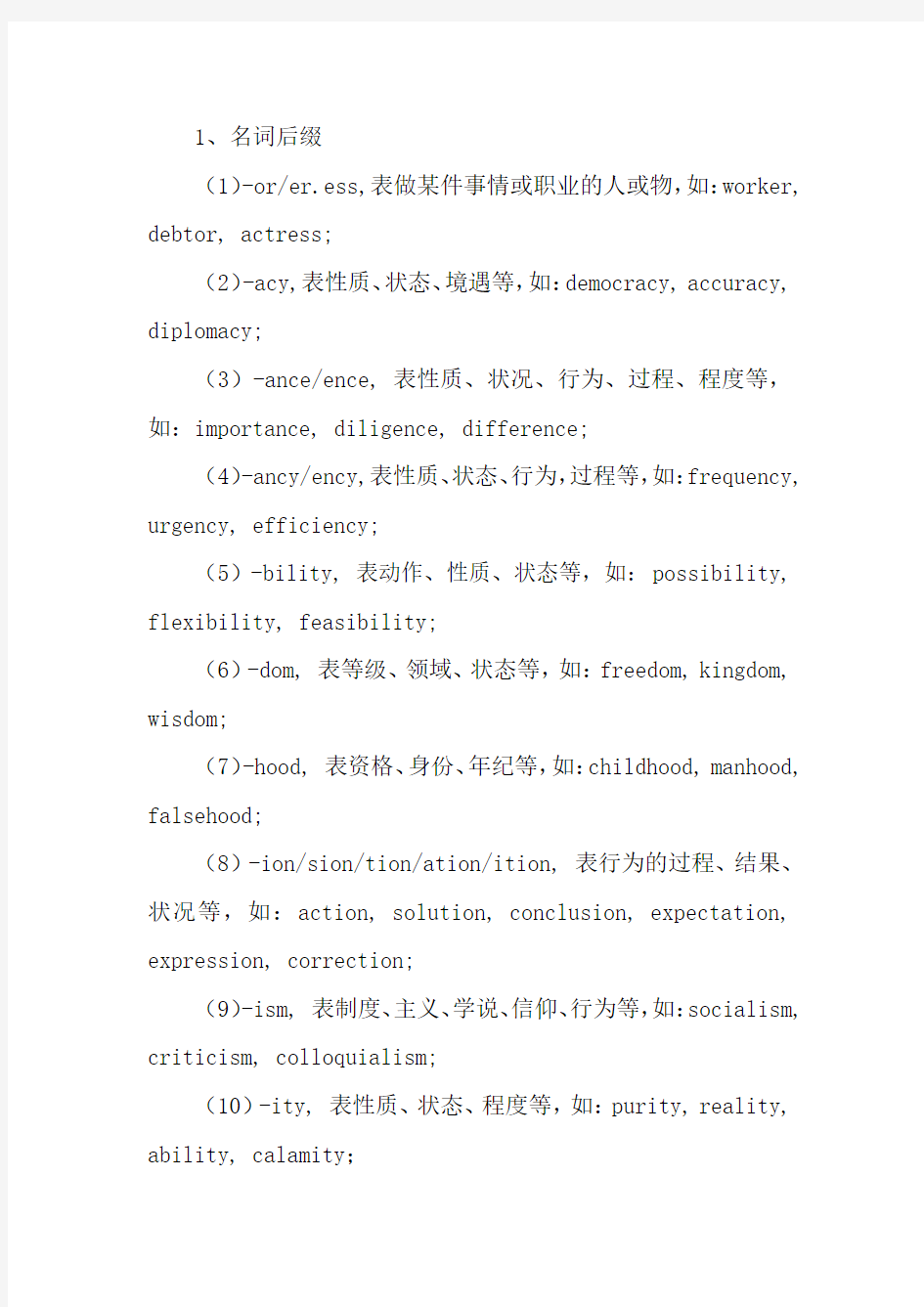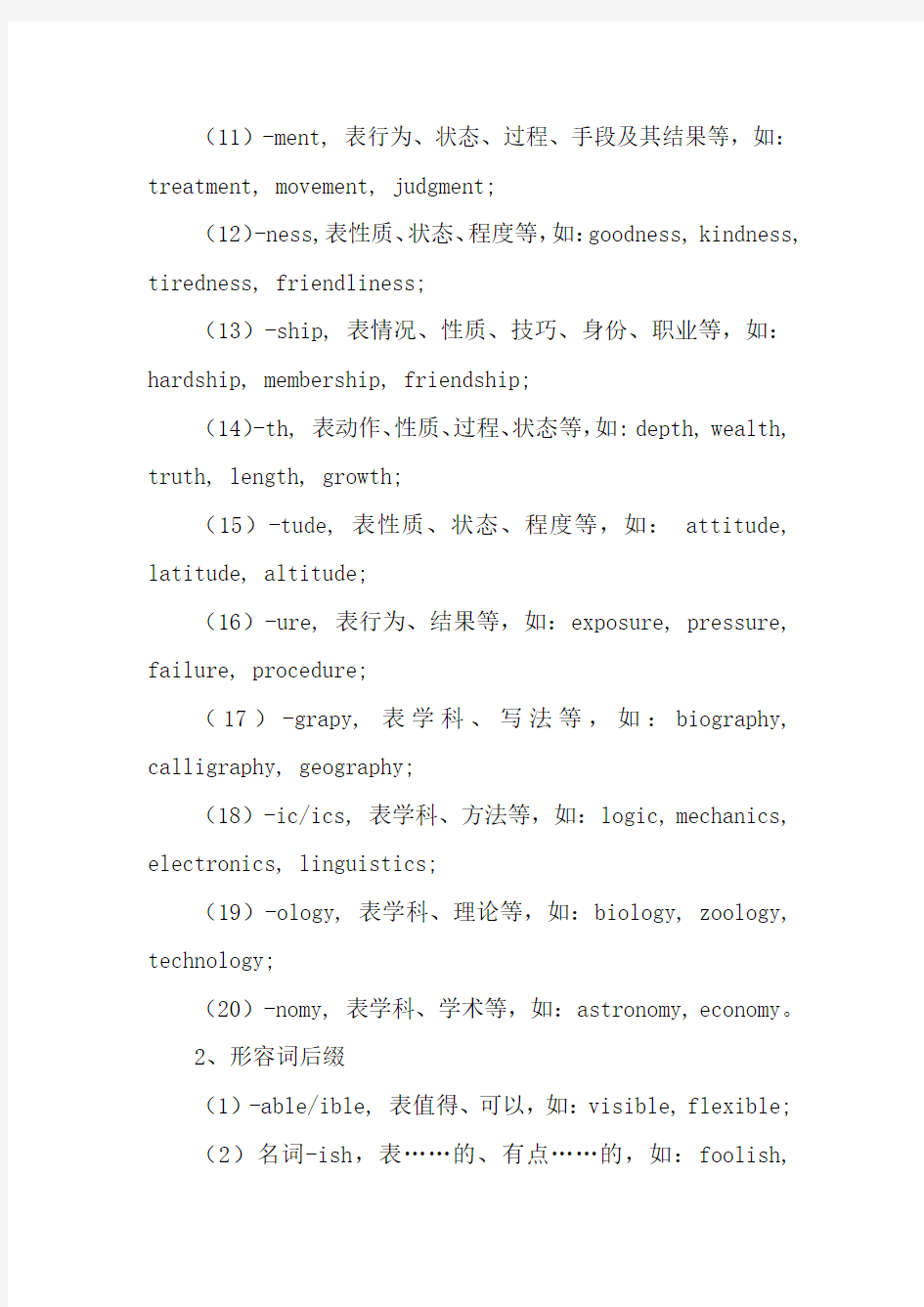单词后缀词性


1、名词后缀
(1)-or/er.ess,表做某件事情或职业的人或物,如:worker, debtor, actress;
(2)-acy,表性质、状态、境遇等,如:democracy, accuracy, diplomacy;
(3)-ance/ence, 表性质、状况、行为、过程、程度等,如:importance, diligence, difference;
(4)-ancy/ency,表性质、状态、行为,过程等,如:frequency, urgency, efficiency;
(5)-bility, 表动作、性质、状态等,如:possibility, flexibility, feasibility;
(6)-dom, 表等级、领域、状态等,如:freedom, kingdom, wisdom;
(7)-hood, 表资格、身份、年纪等,如:childhood, manhood, falsehood;
(8)-ion/sion/tion/ation/ition, 表行为的过程、结果、状况等,如:action, solution, conclusion, expectation, expression, correction;
(9)-ism, 表制度、主义、学说、信仰、行为等,如:socialism, criticism, colloquialism;
(10)-ity, 表性质、状态、程度等,如:purity, reality, ability, calamity;
(11)-ment, 表行为、状态、过程、手段及其结果等,如:treatment, movement, judgment;
(12)-ness,表性质、状态、程度等,如:goodness, kindness, tiredness, friendliness;
(13)-ship, 表情况、性质、技巧、身份、职业等,如:hardship, membership, friendship;
(14)-th, 表动作、性质、过程、状态等,如: depth, wealth, truth, length, growth;
(15)-tude, 表性质、状态、程度等,如: attitude, latitude, altitude;
(16)-ure, 表行为、结果等,如:exposure, pressure, failure, procedure;
(17)-grapy, 表学科、写法等,如:biography, calligraphy, geography;
(18)-ic/ics, 表学科、方法等,如:logic, mechanics, electronics, linguistics;
(19)-ology, 表学科、理论等,如:biology, zoology, technology;
(20)-nomy, 表学科、学术等,如:astronomy, economy。
2、形容词后缀
(1)-able/ible, 表值得、可以,如:visible, flexible;
(2)名词-ish,表……的、有点……的,如:foolish,
bookish, selfish;
(3)-ive, 表……的,如:active, sensitive, productive;
(4)-like, 表像……的,如:manlike, childlike;
(5)名词-ly, 表……的,如:manly, fatherly, scholarly, motherly;
(6)-some, 表……的,如:troublesome, handsome;
(7)-ful,表……的,如:beautiful, wonderful, helpful, truthful;
(8)-ous, 表……的,如:dangerous, generous, courageous, various;
(9)-ent, 表……的,如:dependent, violent;
(10)-most, 表最……的,如:foremost, topmost;
(11)-less, 表否定,如:countless, stainless, wireless。
3、动词后缀
(1)-ize/ise, 表做成、变成、使……化,如:modernize, mechanize, democratize, organize;
(2)-en, 表使成为、引起,使有,如:quicken, weaken, soften, harden;
(3)-fy, 表使……化、使成,如:beautify, purify, intensify, signify, simplify;
(4)-ish, 表使……、令……,如:finish, abolish,
diminish, establish;
(5)-ate, 表示成为……、处理、作用,如:separate, operate, indicate。
4、副后词后缀
(1)形容词-ly, 表……地,如:badly, carefully, highly;
(2)-wise, 表朝向……,如:clockwise, likewise;
(3)-wards, 表朝向……,如:outwards, northwards。
英语单词词性缩写(免费)
所有英语单词词性缩写 prep = 介系词;前置词,preposition的缩写 pron = 代名词,pronoun的缩写 n = 名词,noun的缩写 v = 动词,兼指及物动词和不及物动词,verb的缩写 conj = 连接词,conjunction的缩写 s = 主词 sc = 主词补语 o = 受词 oc = 受词补语 vi = 不及物动词,intransitive verb的缩写 vt = 及物动词,transitive verb的缩写 aux.v = 助动词,auxiliary 的缩写 a = 形容词,adjective的缩写 ad = 副词,adverb的缩写 art = 冠词,article的缩写 num = 数词,numeral的缩写 int = 感叹词,interjection的缩写 u = 不可数名词,uncountable noun的缩写 c = 可数名词,countable noun的缩写 pl = 复数,plural的缩写语气词 int. 缩写词 abbr. abbr abbreviation(略)略语 adj, adjjadjective(s)(形)形容词 adv, advvadverb(s)(副)副词 adv partadverbial particle(副接)副词接语 aux auxiliary(助)助动词 cn countable noun(可数)可数名词 conj conjunction(连)连接 def art definite article(定冠)定冠词 egfor example(例如)例如 esp especially(尤指)尤指 etc and the others(等)等等 ie which is to say(意即)意即 indef art indefinite article(不定冠词)不定冠词 inf infinitive(不定词)不定词 int interjection(感)感叹词 n noun(s) (名)名词 neg negative(ly)(否定)否定的(地) part adj participial adjective(分形)分词形容词pers person(人称)人称pers pron personal pronoun(人称代)人称代名词pl plural(复)复数(的) pp past participle (过去分词)过去分词pref prefix(字首)字首prep preposition(al) (介词)介词,介系词,介词的pron pronoun (代)代名词pt past tense(过去)过去式sb somebody(某人)某人sing singular(单)单数(的) sth something(某事物)某物或某事suff suffix(字尾)字尾un uncountable noun(不可数)不可数名词US America(n)(美)美国(的) vverb(s) (动)动词[VP]V erb Pattern(动型)动词类型v iverb intransitive(不及物动词)不及物动词vt verb transitive (及物动词)及物动词 一.名词(Noun.N) 1.定义:人、地、物、事或观念等名称叫做名词。 人:Edison(爱迪生),Helen(海伦),Mr.Wang(王先生) 地:Asia(亚洲),China(中国),New York(纽约) 物:book(书),dog(狗),tree(树),water(水) 事或观念:work(工作),music(音乐),truth(真理) 注: (1).如人名、地名、国名等属于该名称持有者专用的名称,其第一字母必须大写,如Edison,New York,China。 (2).名词亦有可数和不可数之分,如果是可数的就有单数和复数的区别。所谓复数就是多于一个的意思,通常是在单数名词的词尾加“-s,es,ies,…”以示其为复数。例如:
英文后缀大全
英语单词后缀 1. 名词后缀 (1) 具有某种职业或动作的人 1)-an, -ain, 表示"……地方的人,精通……的人”American, historian, 2)-al, 表示"具有……职务的人" principal, 3)-ant,-ent, 表示"……者”merchant, agent, servant, student, 4)-ar, 表示"……的人”scholar, liar, peddler(毒品贩子) 5)-ard, -art, 表示"做……的人”coward(懦夫), laggard(迟缓的人), braggart(夸张者) 6)-arian, 表示"……派别的人,……主义的人”humanitarian, vegetarian 7)-ary, 表示"从事……的人" secretary, missionary(传教士) 8)-ant, 表示"具有……职责的人" candidate, graduate 9)-ator, 表示"做……的人" educator, speculator(投机者) 10)-crat, 表示"某种政体,主义的支持者" democrat, bureaucrat(官僚主义者) 11)-ee, 表示"动作承受者" employee, examinee 12)-eer, 表示"从事于……人" engineer, volunteer 13)-er, 表示"从事某种职业的人, 某地区,地方的人" banker, observer, Londoner, villager 14)-ese, 表示" ……国人,…..地方的人”Japanese, Cantonese 15)-ess, 表示"阴性人称名词,actress, hostess, manageress 16)-eur, 表示"……家”amateur(业余爱好者,门外汉), littérateur 17)-ian, 表示"……地方人,信仰…….教的人,从事……职业的人”Christian, physician(内科医生),musician 18)-ician, 表示"精通者,……家,”electrician, magician, technician 19)-icist, 表示"……家,…….者, …….能手”physicist, phoneticist(语音学家), technicist 20)-ic, 表示"……者,……师" mechanic, critic 21)-ie, 表示"爱,指小" dearie(可爱的小宝贝), auntie, lassie(小姑娘) 22)-ier, 表示"从事……职业”cavalier(骑士,武士,有礼貌的绅士), clothier (服装商), brazier(黄铜匠) 23)-ine, ian, 表示"阴性人称" heroine, ballerina 24)-ist, 表示"从事……研究者,信仰……主义者" pianist, communist, dentist, artist, chemist 25)-ive, 表示"动作者,行为者”native, captive(俘虏) 26)-logist, 表示"……学家,研究者" biologist, geologist(地质学家) 27)-or, 表示"……者" author, doctor, operator, 28)-ster, 表示"做…….事情的人”youngster, gamester(赌徒),songster(歌唱家) 29)-yer, 表示" 从事……职业者”lawyer (2). 构成,具有抽象名词的含义 1)-acy, 表示"性质,状态,境遇" accuracy, diplomacy 2)-age, 表示"状态,行为,身份及其结果,总称" courage, storage, marriage 3)-al,???? a) 表示"事物的动作,过程”refusal, arrival, survival, denial, approval
英语单词各种词性一览表
英语单词 各种词性 一览表 词性尾缀其实很多,大家主要记住最常用的 1. 名词后缀 1)-or/er/ess/crat/cis:做某件事情或职业的人或物:worker, debtor 2)-acy, 表示"性质,状态,境遇" democracy, accuracy, diplomacy 3)-ance, -ence表示"性质,状况,行为,过程,总量,程度”importance, diligence, difference, obedience 4)-ancy, -ency, 表示"性质,状态,行为,过程" frequency, urgency, efficiency, 5)-bility, 表示"动作,性质,状态" possibility, flexibility, feasibility, 6)-dom, 表示"等级,领域,状态" freedom, kingdom, wisdom 7)-hood, 表示"资格,身份, 年纪,状态" childhood, manhood, falsehood 8)-ion, -sion, -tion, -ation, -ition, 表示"行为的过程,结果,状况" action, solution, conclusion, destruction, expression, correction 9)-ism, 表示"制度,主义,学说,信仰,行为" socialism, criticism, colloquialism, heroism 10)-ity, 表示"性质,状态,程度”purity, reality, ability, calamity 11)-ment, 表示"行为,状态,过程,手段及其结果treatment, movement, judgment, punishment, argument 12)-ness, 表示"性质,状态,程度" goodness, kindness, tiredness, friendliness 13)-ship, 表示"情况,性质,技巧,技能及身份,职业”hardship, membership, friendship 14)-th, 表示"动作,性质,过程,状态" depth, wealth, truth, length, growth 15)-tude, 表示"性质,状态,程度" latitude, altitude(海拔) 16)-ure, 表示"行为,结果" exposure, pressure, failure, procedure(手续), 17-grapy, 表示"……学,写法”biography, calligraphy, geography 18)-ic, ics, 表示"……学……法" logic, mechanics, electronics, linguistics 19)-ology, 表示"……学……论”biology, zoology, technology(工艺学) 20)-nomy, 表示"……学……术" astronomy, economy, bionomy(生态学) 2. 形容词后缀 (1)带有“属性,倾向,相关”的含义 1)-able, -ible, visible, flexible 2)名词-ish, foolish, bookish, selfish(注意accomplish, vanish) 3)-ive, active, sensitive, productive
英语单词词性全部解析
词性: 英语里的词汇分为10种词性,分别是:n. 名词 v. 动词 pron. 代词 adj. 形容词 adv. 副词 num.数词 art. 冠词 prep. 介词 conj. 连词 int. 感叹词,除这十大类词之外,英语还另有判断词yes和no。 1.名词 名词可以分为专有名词(Proper Nouns)和普通名词 (Common Nouns),专有名词是某个(些) 人,地方,机构等专有的名称,如Beijing,China等。普通名词是一类人或东西或是一个抽象概念的名词,如:book,sadness等。 2. 形容词 形容词修饰名词,说明事物或人的性质或特征。通常,可将形容词分成性质形容词和叙述形容词两类,其位置不一定都放在名词前面。 1) 直接说明事物的性质或特征的形容词是性质形容词,它有级的变化,可以用程度副词修饰,在句中可作定语、表语和补语。例如:hot 热的。 2) 叙述形容词只能作表语,所以又称为表语形容词。这类形容词没有级的变化,也不可用程度副词修饰。例如:afraid 害怕的。 (错) He is an ill man. (对) The man is ill. (错) She is an afraid girl. (对) The girl is afraid. 3)形容词作定语修饰名词时,要放在名词的前边。但是如果形容词修饰以-thing为字尾的词语时,要放在这些词之后,例如: something nice 3.副词 副词主要用来修饰动词,形容词,副词或其他结构。 一、副词的位置: 1)在动词之前。 2)在be动词、助动词之后。 3)多个助动词时,副词一般放在第一个助动词后。 副词的作用: (1)作状语,常来修饰动词、形容词或其他副词。 (2)作表语,放在be动词的后面。 (3)作定语,常放在它所修饰的名词的后面。 注意: a. 大多数方式副词位于句尾,但宾语过长,副词可以提前,以使句子平衡。 We could see very clearly a strange light ahead of us. b. 方式副词well,badly糟、坏,hard等只放在句尾。 He speaks English well. 二、副词的排列顺序: 1)时间,地点副词,小单位的在前,大单位在后。 2)方式副词,短的在前,长的在后,并用and或but等连词连接。 Please write slowly and carefully. 3)多个不同副词排列:程度+地点+方式+时间副词。 注意:副词very 可以修饰形容词,但不能修饰动词。 改错:(错) I very like English. (对) I like English very much. 注意:副词enough要放在形容词的后面,形容词enough放在名词前后都可。 I don't know him well enough. There is enough food for everyone to eat.
根据单词后缀判断词性教学提纲
根据单词后缀判断词 性
1)具有某种职业或动作的人 2) 3)1)-an, -ain, 表示"……地方的人,精通……的人”American, historian, 4)2)-al, 表示"具有……职务的人" principal, 5)3)-ant,-ent, 表示"……者” merchant, agent, servant, student, 6)4)-ar, 表示"……的人” scholar, liar, peddler 7)5)-ard, -art, 表示"做……的人”coward, laggard, braggart (夸张者) 8)6)-arian, 表示"……派别的人,……主义的人”humanitarian, vegetarian 9)7)-ary, 表示"从事……的人" secretary, missionary 10)8)-ant, 表示"具有……职责的人" candidate, graduate 11)9)-ator, 表示"做……的人" educator, speculator(投机者) 12)10)-crat, 表示"某种政体,主义的支持者" democrat, bureaucrat 13)11)-ee, 表示"动作承受者" employee, examinee 14)12)-eer, 表示"从事于……人" engineer, volunteer 15)13)-er, 表示"从事某种职业的人, 某地区,地方的人" banker, observer, Londoner, villager 16)14)-ese, 表示" ……国人,…..地方的人”Japanese, Cantonese 17)15)-ess, 表示"阴性人称名词, actress, hostess, manageress 18)16)-eur, 表示"……家” amateur, littérateur 19)17)-ian, 表示"……地方人,信仰…….教的人,从事……职业的 人”Christian, physician(内科医生),musician 20)18)-ician, 表示"精通者,……家,”electrician, magician, technician
英语单词词性转换
英语单词词性转换 一、动词(v.)→名词(n.) 1、词尾加上-er或-or之后就变成了表示"某一类人"的名词 例如:work—worker, teach—teacher, sing—singer, jump—jumper, play—player, learn—learner, visit—visitor, invent—inventor,collect—collector等. 注意:1)以不发音的e结尾的动词,在词尾加-r. 例如:drive—driver, write—writer等. 2)以辅音字母开头并以元音字母加辅音字母结尾的单词,应双写末尾的辅音字母再加er。例如:run—runner, win—winner,begin—beginner等. 2.在动词词尾加上-ment 变成名词 例如:achieve—achievement (成就) advertise—advertisement//advertising(广告) agree—agreement disagree—disagreement amuse—amusement (娱乐) improve—improvement(争吵) commit(奉献)—commitment develop—development (发展) 有些单词比较特殊,需把动词后的e去掉再加ment. 例如:argue—argument(争论) 3.在动词词尾加上-(t)ion/(s)ion变成名词 例如: attract—attraction; instruct—instruction; invent—invention discuss—discussion; express—expression educate—education; graduate—graduation; operate—operation (去e再加"ion") compete—competition; organize—organization (把e改成其他字母再加"tion")
所有英语单词词性缩写
. 所有英语单词词性缩写 prep = 介系词;前置词,preposition的缩写pron = 代名词,pronoun的缩写 n = 名词,noun的缩写 v = 动词,兼指及物动词和不及物动词,verb的缩写conj = 连接词,conjunction的缩写 s = 主词 sc = 主词补语 o = 受词 oc = 受词补语 vi = 不及物动词,intransitive verb的缩写 vt = 及物动词,transitive verb的缩写 aux.v = 助动词,auxiliary的缩写 a = 形容词,adjective的缩写 ad = 副词,adverb的缩写 art = 冠词,article的缩写 num = 数词,numeral的缩写 int = 感叹词,interjection的缩写 u = 不可数名词,uncountable noun的缩写 c = 可数名词,countable noun的缩写 pl = 复数,plural的缩写 语气词int. 缩写词abbr. abbr abbreviation(略)略语 adj, adjjadjective(s)(形)形容词 adv, advvadverb(s)(副)副词 adv partadverbial particle(副接)副词接语 aux auxiliary(助)助动词cn countable noun(可数)可数名词 conj conjunction(连)连接 def art definite article(定冠)定冠词 egfor example(例如)例如 esp especially(尤指)尤指 etc and the others(等)等等 ie which is to say(意即)意即 indef art indefinite article(不定冠词)不定冠词 inf infinitive(不定词)不定词 int interjection(感)感叹词 n noun(s) (名)名词 neg negative(ly)(否定)否定的(地) part adj participial adjective(分形)分词形容词pers person(人称)人称 pers pron personal pronoun(人称代)人称代名词pl plural(复)复数(的) pp past participle (过去分词)过去分词 pref prefix(字首)字首 prep preposition(al) (介词)介词,介系词,介词的pron pronoun (代)代名词 pt past tense(过去)过去式 sb somebody(某人)某人 sing singular(单)单数(的) sth something(某事物)某物或某事 suff suffix(字尾)字尾 un uncountable noun(不可数)不可数名词 US America(n)(美)美国(的) vverb(s) (动)动词
单词后缀与词性
单词后缀与词性 推荐学习 先从观察单词的长相开始吧,在学习过程中应当注意一些前缀和后缀,这对了解词性有很大帮助;其次,就是在句子文章中来理解,看单词被放置在什么位置上,注意句型结构,了解特定的词放在特定的位置上,就可以很容易知道词性了~ 举个很简单的例子,比如educate,教育,是动词,去e加上or,educator,教育家,变成名词,加-ion,education,教育,还是名词,而在此基础上再加-al,educational,教育的,就成为形容词了~ 把握词根,前缀后缀,很重要~ 如何区分名词、动词、形容词?可以从以下几方面入手。 第一,应先死抠定义,把握住不同词性的实质。 名词,表示人或者事物名称的词。“事物”包括几种?一般可分为“抽象事物”“具体事物”所谓“抽象事物”是指看不见、摸不到的事物,如社会、时间等;所谓“具体事物”是指能依靠感官感受到的事物。如桌子,水等。 动词,表示人的动作,行为,心理活动或事物的发展、变化的词。如何区别“动作”和“行为”?简言之,“动作”单一;“行为”是动作的组合。如“看,听,写”表动作,“学习”表行为。“打、杀、抢”表动作,“犯罪”表行为。如何区别发展和变化?发展即事物的扩展进步,如长、前进;变化指事物前后的改变,如“停、灭”等。 形容词,表示事物的形状、性质,状态的词。概念上较易理解。表形状:方、扁、圆;表性质:好、坏、良;表状态:快、慢、稳。 第二,要识记各类词中的一些特殊情况或容易忽略的情况。 1、名词。人名、地名大家容易分辩,特殊情况有:(1)方位名词:如上、里、外-----(注:不要把“桌上,屋里等方位短语误认为作名词。 (2)时间名词,如上午,明天、晚上(注:不要把十一点误认作数量短语或数量词。) 2、动词。特殊情况有:(1)能愿动词:能、会、愿------ (2)趋向动词:来、去、下来----- (3)判断动词:是、等于、为------(有的同学把”不是“这一偏正短语误认作判断动词。
英语词性缩写
英语词性缩写 n = 名词,noun的缩写 u = 不可数名词,uncountable noun的缩写 c = 可数名词,countable noun的缩写 v = 动词,verb的缩写 vi = 不及物动词,intransitive verb 的缩写 vt = 及物动词,transitive verb的缩写 aux.v = 助动词,auxiliary verb 的缩写 model verb情态动词 conj = 连接词,conjunction的缩写 adj. = 形容词,adjective的缩写adv.= 副词,adverb的缩写 art. = 冠词,article的缩写 prep = 介词;preposition的缩写pron = 代名词,pronoun的缩写num = 数词,numeral的缩写int. = 感叹词,interjection的缩写 英文基本句式介绍: 五个基本句式可以演变出多种复杂的英语句子。 这五个基本句式如下: S十V主谓结构 S十V十P主系表结构 S十V十O主谓宾结构 S十V十O1十O2 主谓双宾结构 S十V十O十C 主谓宾补结构 (说明:S=主语;V=谓语;P=表语;O=宾语;O1=间接宾语;O2 =直接宾语;C=补语) 1.S十V
在此句式中,V是不及物动词,又叫自动词(vi.)。例如: He runs quickly.他跑得快。 They listened carefully.他们听得很仔细。 He suffered from cold and hunger.他挨冻受饿。 China belongs to the third world country.中国属于第三世界国家。The gas has given out.煤气用完了。 My ink has run out.我的钢笔水用完了。 2.S十V十P 在此句式中,V是系动词(link v.),常见的系动词有:look,seem,appear,sound,feel,taste,smell,grow,get,fall ill/asleep,stand/sit still,become,turn等。例如: He is older than he looks.他比看上去要老。 He seen interested in the book.他似乎对这本书感兴趣。 The story sounds interesting.这个故事听起来有趣。 The desk feels hard.书桌摸起来很硬。 The cake tastes nice.饼尝起来很香。 The flowers smell sweet and nice.花闻起来香甜。 You have grown taller than before.你长得比以前高了。 He has suddenly fallen ill.他突然病倒了。 He stood quite still.他静静地站看。 He becomes a teacher when he grew up.他长大后当了教师。 He could never turn traitor to his country.他永远不会背叛他的祖国。3.S十V十O
英语单词用词缀判断词性
一、名词后缀 1.ce,ance,ence appear(出现,公开露面)—appearance refer(提交,谈及,提到,涉及,查阅,咨询)—reference(提及,涉及,参考,参考书目,证明书(人),介绍信(人),audience,advice,allowance,ambulance,appearance 2.al: arrival,refusal,revival,removal,approval 4.cy: accurate(正确的,精确的)—accuracy(精确性,正确度) private—privacy,emergency,frequency,urgency,efficiency,agency 5.dom: freedom,kingdom,wisdom 6.er,or,ar,ist,ant,ent,ess(女):人、职业 painter,worker,beg(请求,乞求)—beggar(乞丐),piano-pianist,violin(小提琴)—violinist,apply—applicant,correspond(通信)—correspondent(通讯记者)actress,waiter—waitress,analyst 7.hood:时期,人,关系 child—childhood,man—manbood(成年男子)neighborhood(附近,邻居关系) 8.ty: cruel—cruelty,pure—purity,activity,reality,ability,calamity 9.ment:状态,行动等 move—movement,retire—retirement,state-statement,treat-treatment,judgment,punishment,argu ment,assignment 10.ness: dark—darkness,happy—happiness,awareness,kindness,tiredness, 11.ology:学(学术类) biology,geologyphysiologypsychology,technology 12.ship:才能,状态,资格,品质 Friendship,relationship,scholar(学者)—scholarship(奖学金,学问,学识)leadership,hardship,membership,oppression,possession,education 13.ion,sion,tion,ation,ition:行为的过程,结果,状况 decide-decision,expand-expansion,alter-alteration,action,solution,conclusion,destruction,expressi on,correction,oppression,ambition 14.sure: measure,pressure 15.th: grow—growth,wide—width,deep-depth,health,wealth,truth,length 16.ture: nature,mature,future,agriculture,architecture 二、动词后缀 1.-ify意为:转为,变为 class—classify(分类,分为),simple—simplify(单一化,简单化),
所有英语单词词性缩写
所有英语单词词性缩写集团文件发布号:(9816-UATWW-MWUB-WUNN-INNUL-DQQTY-
所有英语单词词性缩写 prep = 介系词;前置词,preposition的缩写 pron = 代名词,pronoun的缩写 n = 名词,noun的缩写 v = 动词,兼指及物动词和不及物动词,verb 的缩写 conj = 连接词,conjunction的缩写 s = 主词 sc = 主词补语 o = 受词 oc = 受词补语 vi = 不及物动词,intransitive verb的缩写 vt = 及物动词,transitive verb的缩写aux.v = 助动词,auxiliary的缩写 a = 形容词,adjective的缩写 ad = 副词,adverb的缩写 art = 冠词,article的缩写 num = 数词,numeral的缩写 int = 感叹词,interjection的缩写 u = 不可数名词,uncountable noun的缩写 c = 可数名词,countable noun的缩写 pl = 复数,plural的缩写 语气词 int. 缩写词 abbr. abbr abbreviation(略)略语 adj, adjjadjective(s)(形)形容词adv, advvadverb(s)(副)副词 adv partadverbial particle(副接)副词 接语 aux auxiliary(助)助动词 cn countable noun(可数)可数名词 conj conjunction(连)连接 def art definite article(定冠)定冠词egfor example(例如)例如 esp especially(尤指)尤指 etc and the others(等)等等 ie which is to say(意即)意即 indef art indefinite article(不定冠词)不定冠词 inf infinitive(不定词)不定词 int interjection(感)感叹词 n noun(s) (名)名词 neg negative(ly)(否定)否定的(地) part adj participial adjective(分形) 分词形容词 pers person(人称)人称 pers pron personal pronoun(人称代)人 称代名词 pl plural(复)复数(的) pp past participle (过去分词)过去分词pref prefix(字首)字首 prep preposition(al) (介词)介词,介系词,介词的 pron pronoun (代)代名词 pt past tense(过去)过去式 sb somebody(某人)某人 sing singular(单)单数(的) sth something(某事物)某物或某事
(完整版)英语词性后缀
后缀-名词后缀 常见的此类后缀及其具体含义如下: 1.-ster,-eer,-er(or)意为:从事某种职业或参与某种活动的人(person engaged in an occupation or activity)例词:gamester,gangster,songster,engineer,profiteer,mountaineer,auctioneer,driver,teacher,director,actor,professor 2.-let意为:小或者不重要的东西(small,unimportant things)例词:booklet,leaflet,starlet 3.-ette意为:1)小的东西(small)例词:cigarette 2)假的东西(imitation)例词:leatherette 3)女性(female)例词:usherette 4.-ess意为:女性(female)例词:actress,poetess,hostess,paintress 5.-hood意为:时期(status;etc.)例词:boyhood男孩时代,childhood 童年,manhood成年男子 6.-ship意为:才能,状态,资格,品质等(skill,state,condition,status,quality)例词:leadership领导才能,friendship友谊,membership 会员资格,lectureship讲师,sportsmanship运动精神 7.-ful意为:量(the amount which noun contains)例词:cupful,handful,mouthful,spoonful 8.-tion,-ion意为:1)状态,行动等(state;action;etc.)例词:action动作,oppression苦恼,possession财产,education教育)。机构等(institution;etc.)例词:organization组织,foundation基金9.-ment意为:状态,行动等(state;action;etc.)例词:movement 运动,pavement人行道,development发展 10.-al意为:动作(action)例词:arrival,refusal,revival,recital,removal 11.-age意为:程度,数量等(extent;amount;etc.)例词:wastage 消耗,coverage范围,acreage土地面积,breakage破坏,hostage抵押品12.-ness;-ity(ty)意为:状态,品质(state;quality;etc.)例词:happiness幸福,usefulness有用,kindness可爱,rapidity迅速,activity 活跃,sanity头脑清楚,changeability可变性 13.-ism意为:道义,主义,学说等(doctrine of,practice of)例词:idealism,impressionism,absenteeism,racism 14.-th length(长度) 后缀-动词后缀 常见的此类后缀及其具体含义如下: 1.-ify意为:转为,变为(to turn into,to make or become)例词:beautify美化,diversify使多样化,simplify简化 2.-ize;-en意为:使……,变得……(to make or become;to make into)
英语单词词性转变的一般规律
英语单词词性转变的一般规律 1.动词(v.)→名词(n.) (a)词形不变,词性改变 例如:work, study, water, plant等可以用作动词(工作,学习,浇水,种植),也可以用作名词(工作,学习,水,植物). (b)一些动词在词尾加上-er或-or之后就变成了表示"某一类人"的名词 例如:work—worker, teach—teacher, sing—singer, jump—jumper, play—player, learn—learner, visit—visitor, invent—inventor, collect—collector等. 注意:1)以不发音的e结尾的动词,在词尾加-r. 例如:drive—driver, write—writer等. 2)以重读闭音节结尾,且末尾只有一个辅音字母的动词,应双写末尾的辅音字母,再加-er 例如:run—runner, win—winner, begin—beginner等. (c)在动词词尾加上-ment 变成名词 例如:achieve—achievement (成就) advertise—advertisement//advertising(广告) agree—agreement disagree—disagreement amuse—amusement (娱乐) improve—improvement(争吵) commit(奉献)—commitment develop—development (发展) depart离开;出发,起程;违反;去世—department (局,部) govern(统治)—government(政府) manage—management (管理) equip—equipment (装备) 有些单词比较特殊,需把动词后的e去掉再加ment. 例如:argue—argument(争论) (d)在动词词尾加上-(t)ion/(s)ion变成名词 例如: attract—attraction; instruct—instruction; invent—invention discuss—discussion; express—expression educate—education; graduate—graduation; operate—operation (去e再加"ion") compete—competition; organize—organization (把e改成其他字母再加"tion") decide—decision conclude—conclusion (把de改为s再加"ion") describe—description描写,描绘 (这是特例,不规则变化) (e)在动词词尾加上-ance变成名词 例如: appear—appearance (外貌;出现) perform—performance (演出) accept—acceptance (接受) (f)在动词词尾加-ing变成名词 (方法与动词变为现在分词的方法相同) 例如:meet—meeting build—building wait—waiting bathe—bathing say—saying(谚语) mean—meaning
英语单词用词缀判断词性
一、名词后缀 1. ce, ance, ence appear(出现, 公开露面)—appearance refer(提交, 谈及,提到, 涉及, 查阅, 咨询)—reference(提及, 涉及, 参考, 参考书目, 证明书(人), 介绍信(人), audience, advice, allowance, ambulance, appearance 2. al: arrival, refusal, revival, removal, approval 4. cy : accurate(正确的, 精确的)—accuracy(精确性, 正确度) private—privacy, emergency, frequency, urgency, efficiency, agency 5. dom: freedom, kingdom, wisdom 6. er,or,ar, ist, ant, ent, ess(女): 人、职业 painter, worker, beg(请求, 乞求)—beggar(乞丐), piano-pianist, violin(小提琴)—violinist, apply—applicant, correspond(通信)—correspondent(通讯记者)actress,waiter—waitress, analyst 7. hood : 时期,人,关系 child—childhood, man—manbood(成年男子)neighborhood(附近,邻居关系)8. ty : cruel—cruelty, pure—purity, activity, reality, ability, calamity 9. ment :状态,行动等 move—movement,retire—retirement,state-statement, treat-treatment, judgment, punishment, argument, assignment 10. ness : dark—darkness, happy—happiness, awareness, kindness, tiredness, 11. ology : 学(学术类) biology, geology physiology psychology, technology 12. ship :才能,状态,资格,品质 Friendship, relationship, scholar(学者)—scholarship(奖学金, 学问, 学识)leadership,hardship,membership, oppression, possession, education 13. ion, sion, tion, ation, ition:行为的过程,结果,状况 decide-decision,expand-expansion, alter-alteration,action, solution, conclusion, destru ction, expression, correction, oppression, ambition 14. sure: measure, pressure 15. th : grow—growth, wide—width, deep-depth, health, wealth, truth, length 16. ture: nature, mature, future, agriculture, architecture 二、动词后缀 1.-ify意为:转为,变为 class—classify(分类, 分为), simple—simplify(单一化, 简单化), 2.-ize;(美)ise,(英)-en:使……,……化,变得……
